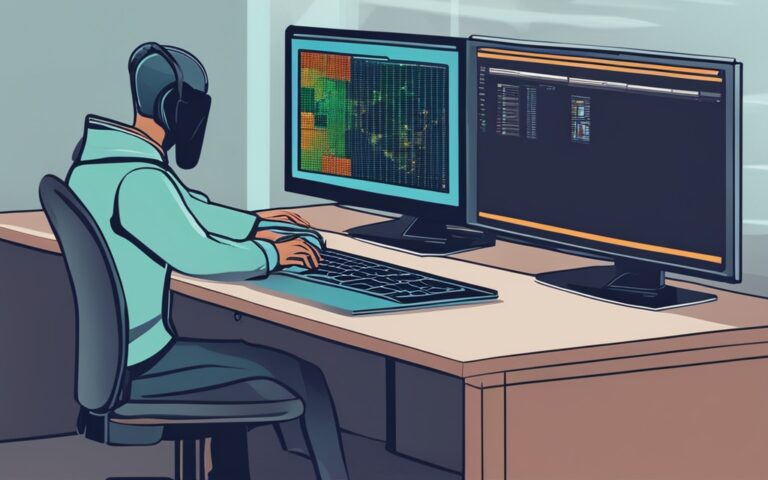Citizen science in computer science means people like you and me join in on scientific research and discoveries. It’s all about working together to make new things happen. This way, we all get to help move science forward.
- Citizen science in computer science lets people like us take part in scientific research and discoveries.
- Working together with experts helps us come up with new ideas and make big steps in science.
- Getting citizens involved in computer science makes science more open to everyone.
- Projects like Zooniverse give us online places to help with research and gather data.
- Using artificial intelligence (AI) in these projects makes things run smoother and helps us understand data better.
When we get citizens involved in computer science, we use everyone’s skills and ideas to push innovation forward. This teamwork and AI technology help us tackle big challenges and make the future brighter for everyone.
Reference:1
The Need for Institutional Change in Computer Science Education
Computer science education is key to the future of tech and innovation. Yet, it’s tainted by biases and social structures that keep some groups down. We must change how computer science education works to fix this.
Just focusing on tech skills isn’t enough. We need a justice-focused approach to computer science education. This means understanding the hurdles faced by underrepresented groups in computer science.
Just making more computing resources available isn’t enough. Data2 shows that different racial groups face different challenges in CS. For example, fewer Black and Hispanic students passed the AP CS Principles exam than white and Asian students. This shows we need to tackle deep-seated inequalities in computer science education.
We should move towards culturally responsive computing (CRC). CRC means making CS education more community-focused. It values students’ diverse backgrounds and aims for an inclusive classroom.
Questioning the ethics of tech, like facial recognition, is crucial in CS education. This shows the need for thoughtful and responsible tech development.
Teachers need to be part of the change. They should learn about critical computing to fight against bias. This can help change the way CS is taught, making it more just and fair.
CS education should link up with the humanities and citizenship. This helps students see how computing affects society and its ethical sides. By teaching students to think about these issues, we can build a fairer tech future.
In short, we urgently need to change computer science education to tackle oppression and injustice. By focusing on justice, promoting critical thinking, and linking with the humanities, we can make CS education more inclusive and fair.
Community-Centered Computing Education
Computer science courses often fail marginalized students because they don’t connect with their lives. The curriculum focuses too much on what the tech industry wants, not on what students need.
A shift to a community-centered approach is needed. This means making the curriculum and teaching methods reflect students’ identities, cultures, and experiences. It’s about making computing education more inclusive.
This approach can tackle the issue of information imbalance and create learning spaces that welcome everyone. It’s about giving students a voice and making them feel seen.
“The Galaxy Zoo project, which engages citizen scientists for classifying galaxies, utilized labeled data to train a neural network model for classifying hundreds of millions of unlabeled galaxies.”3
By focusing on community-centered methods, students can better understand computer science and how it affects their lives. It helps them see the relevance of the subject to their own experiences.
When students explore their identities and cultures in computer science, they feel more connected and empowered. This sense of ownership can motivate them to learn more.
Adding cultural relevance to the curriculum helps address the imbalance in traditional computer science education. It makes the subject more relatable and interesting to students from diverse backgrounds.
“Citizen Science enables observation at the scale of ecological change.”4
Community-centered computing education lets students work on real projects and contribute to scientific research. This hands-on approach helps them understand the scientific process better.
Being part of citizen science projects boosts critical thinking and a sense of responsibility towards the environment and communities5.
“Citizen science encourages a sense of community and belonging, fostering stewardship in students, leading to heightened care for the observed ecosystems and communities.”5
By linking computer science education to community-centered methods, students get a full picture of the subject and its societal impact. They learn valuable skills like data collection and analysis, useful in many areas of life5.
“Participation in citizen science projects develops critical thinking skills through experiences in research, community involvement, data collection, analysis, and synthesis of information.”5
Citizen science in the curriculum meets standards set by educational bodies like NGSS, Common Core, and PARCC. It supports teachers and provides students with a comprehensive education5.
“Citizen science projects align with Next Generation Science Standards (NGSS), Common Core (CC) teaching standards, and Partnership for Assessment for Readiness for College and Careers (PARCC) tests, supporting teachers in meeting state and regional teaching requirements.”5
Using a community-centered approach in computing education helps bridge the gap between the curriculum and students’ needs. It empowers students to see themselves in the field and participate in projects that make a difference.
This approach leads to a more inclusive and fair future for computer science. It encourages a new generation of computer scientists who are socially aware and actively involved in their communities.
By doing this, we can create a future where computer science education is not just about knowledge but also about making a positive impact on society.
Bringing Critical Perspectives to Computer Science Education
Learning computer science is not just about getting good at coding. It’s also about understanding how technology affects society and our ethical duties. Adding critical thinking to computer science classes helps tackle unfairness and prepares students to make a positive impact.
Teachers can spark critical thinking by discussing the good and bad sides of technology. Our Voice, a project that involves local people in science, shows the value of critical local wisdom6.
By teaching students to spot and challenge unfairness in tech, we help them become ethical tech experts.
Students learn about issues like biased algorithms, privacy, and unequal access to technology. This makes them ethical and responsible in their tech careers6.
Developing Critical Computing Competencies
Teachers are key in bringing critical thinking to the classroom. They need to keep learning about tech and social issues. This helps them teach students to think deeply about how computer science affects different areas of life.
By teaching critical thinking, educators help students see the big picture of computer science. They encourage students to think about the right and wrong in tech. This helps students understand their role in shaping the future of technology.
Addressing Systemic Injustices
Adding critical thinking to computer science classes lets us tackle deep-seated unfairness in tech. It’s about looking at power, privilege, and how tech affects different communities.
Citizen science projects7 show the power of community-led research. By working with local groups, teachers can learn about the real needs of communities. This helps create tech solutions that are fair and open to everyone6.
Promoting Ethical Responsibility
Computer science education should teach students to use their skills for good. By looking at real-life examples, students see how tech affects people and the planet.
Talking about the ethical sides of new tech helps students make better choices. They learn to think about the long-term effects of their work. This way, they aim to make technology that benefits everyone6.
Preparing Students for a Changing Landscape
Adding critical thinking to computer science prepares students for a fast-changing tech world. It shows how computer science connects with fields like sociology and environmental science. This gives students a full view of technology’s role in society.
This approach gives students a broad knowledge base and diverse viewpoints. It helps them solve complex problems by combining different areas of study. Critical thinking, creativity, and flexibility are key skills in a world that relies more on technology for progress.
By focusing on critical thinking, computer science education goes beyond just coding skills. It prepares students to contribute positively to the development and use of technology, making a real difference in our digital world.
References:
| Reference | Data |
|---|---|
| 6 | Citizen science involves using crowdsourced knowledge for research. The Our Voice citizen science research initiative focuses on health equity. The Our Voice approach elicits critical local wisdom not accessible through traditional research methods. Citizen science encourages collaboration with community-engaged researchers and organizations for local change. Citizen scientists often report gaining new knowledge, activating change, and enhancing community connections. Citizen science projects have led to increased community cohesion, policy-level change, and individual-level feelings of agency. The Our Voice team highlights the importance of engaging individuals in community-driven projects. Citizen science opportunities can lead to improvements in health care delivery. Community-engaged citizen science projects can identify important issues and relevant stakeholders for positive change. Citizen science projects can contribute to policy-level changes and increased community connectedness. The Our Voice team emphasizes a community-driven attitude to maximize the impact of citizen science projects. Citizen science efforts have been recognized at local, national, and international levels. The Our Voice team has been awarded major grants from the National Institutes of Health (NIH). The team is exploring the use of artificial intelligence in generating ideas for positive change in communities. Our Voice’s participatory action research method has led to dozens of scientific publications. Our Voice is part of a Global Network that shares project ideas and outcomes worldwide. |
| 7 | Citizen Science (CS) involves the engagement of non-scientists in scientific research, broadening public participation in science and alternative models of knowledge production. CS covers various scientific fields, with research in biology, ecology, and conservation being prevalent. Three main focal points of CS include biology, conservation, and ecology research; geographic information research; and social sciences and epidemiology research. Types of CS projects include contributory, collaborative, and co-created projects, each involving different degrees of citizen involvement. CS projects have shown to contribute towards conservation attitudes, behaviors, and an increased appreciation of nature and the environment. CS projects can offer authentic experiences for students, lead to increased science knowledge, and develop positive attitudes towards science. Adult participation in CS programs can assist scientific researchers in various research activities. Children and adolescents can contribute significantly to the research process through appropriate guidance and learning designs in CS projects. Digital technologies facilitate interaction and communication between citizens and scientists in CS projects. Digital tools in CS projects can facilitate communication, collaboration, and data collection on a large scale, enhancing the scientific inquiry process. Information and Communication Technologies (ICTs) and digital tools are used in CS projects to involve students in the scientific inquiry process. Mobile technologies in CS projects can enhance and extend the learning experience beyond the classroom walls for K-12 students. |
Teaching Computing as Part of Society
Computer science education must tackle more than just coding skills. It should teach how computing fits into society. By adding civic education, students learn about the big impact of tech on our world. This helps build a fairer and more welcoming future.
Combining computer science with the humanities helps students think deeply about tech’s effects. They learn to see how computing touches issues like bias and fairness. This approach makes students think about how tech fits into the world around them.
Looking at data8, students find hidden problems in tech. For example, some facial recognition systems don’t work well on non-white faces. This can lead to big issues for people and groups.
Projects that tackle real-world problems let students use their tech skills for good. At Princeton University, students made websites for local charities8. These sites helped fight unfair housing and made it easier for people to connect with each other.
The Technology for a Just Society (JuST) group at Princeton shows how to teach computing with a focus on helping society. Led by Amina Elgamal, it connects tech experts with charities to solve social issues8. Students work with groups like the Fairshare Housing Center to make tech that makes a difference.
By seeing computing as part of society, we can train a tech-savvy, socially aware generation. Students learn to think about how tech affects us all. This helps them work towards a fairer future.
Societal Impact of Citizen Science and Computing
Teaching computing in society is key, but so is working with citizen science. This brings together people from all walks of life to tackle big challenges. Citizen science projects, including those in schools, help with research and teach people about civic duty9.
These projects cover many areas, from tracking animals to studying weather910. They let people help with data collection, making research better and teaching kids in a fun way. Through apps and websites, students can be part of important research.
The GLOBE Program lets students around the world help with science and learn about our planet10. By joining in, students get better at science and feel they can make a difference in the environment.
Projects like CrowdMag and GPS on Bench Marks let people make better maps and improve location info10. They show how the public can help with science, making discoveries in many areas.
In short, teaching computing as part of society and supporting citizen science is crucial. It prepares students to be tech-savvy and socially aware. With the right skills and values, they can shape a better future for everyone.
Citizen Science and Computer Science Collaboration
Citizen science projects used to rely on volunteers to handle and analyze big datasets. Now, with computer machine learning, we can work together more efficiently11.
Computer machine learning is changing the game in image recognition11. Computers can now spot patterns in images, helping us sort through huge amounts of data from things like wildlife cameras. This teamwork between people and computers could change how we analyze data in citizen science11.
“Machine learning can be used to quickly and accurately analyze large datasets from citizen science projects.”11
For instance, apps like BloomWatch track cyanobacteria blooms in water using images and other info11. These apps use new tech to help us in many ways, like society, economy, and culture11.
The data from these apps goes into public databases for study and sharing with agencies11. This teamwork between citizens, scientists, and tech has big benefits. It helps science, gets more people involved, and watches over the environment11.
“Working together, citizens, scientists, and tech have made big strides in science and environmental monitoring.”11
But, we must think about the downsides too. Things like privacy, data safety, and biases in how we collect and look at data matter11.
Examples of Citizen Science Projects and Platforms
There are many examples of how people and computers work together in citizen science1112. For example, eBird gets over 100 million bird sightings every year12.
Zooniverse is the biggest place for citizen science, with over 50 projects across different fields12. It lets volunteers help with research and data analysis in areas like arts and astronomy12.
NASA is also into citizen science, tracking penguins and studying giant kelp forests12. National Geographic lists many projects mainly in biology and earth science12.
“People and tech together have made big contributions to citizen science, making data collection and analysis better.”12
The Impact of Collaboration on Sustainable Development Goals (SDGs)
Working together, citizen science and computer science can really help with the Sustainable Development Goals (SDGs)13. These projects tackle big challenges like climate action, sustainable cities, and gender equality13.
A study looked at early citizen science projects and found some interesting facts13. The Crowd4SDG project helped young social entrepreneurs with three innovation cycles13.
In the GEAR cycle 2 coaching program, 14 teams got feedback from peers and mentors13. The projects had teams of 2 to 4 people, showing how diverse they were13.
“Citizen science and computer science working together are key to reaching the Sustainable Development Goals, with a focus on different areas and diverse teams.”13
| Benefits of Collaboration | Examples |
|---|---|
| Advances scientific research | BloomWatch, eBird |
| Increases public engagement | Zooniverse, National Geographic |
| Contributes to environmental monitoring efforts | NASA projects |
Through working together, citizen science and computer science make data analysis better, push science forward, and get more people involved in solving global problems. This partnership is shaping a future where people and computers work together for the good of society1112.
The Benefits of Computer Science in Society
Computer science is key to making society better. It brings many advancements and helps people and communities. Let’s look at the main benefits it offers:
Healthcare Advancements
Computer science has changed healthcare for the better. It helps in medical research, diagnosis, treatment, and patient care. By analyzing lots of data, it finds diseases, discovers drugs, and gives personalized medicine. This has made healthcare better and improved life quality for many14.
Equal Opportunities
Computer science gives everyone a fair chance. It helps bridge the digital gap and make things more inclusive. By giving more people access to technology and teaching them how to use it, everyone can join the digital world. This opens up new chances for education and work1415.
Natural Disaster Prediction
Computer science is great at predicting natural disasters. It uses models, simulations, and data to see what might happen. This means people can prepare for things like hurricanes, earthquakes, and floods. Early warnings save lives and protect property1415.
Education Transformation
Computer science has changed how we learn. It brings technology into the classroom. Now, students can learn in new ways with software, online platforms, and apps. It also teaches them to solve problems and think critically, preparing them for the digital world15.
Digital Connectivity
Computer science has made it easier for people to connect. It has created networks, the internet, and social media. Now, people can share ideas and work together no matter where they are. This has led to more innovation and cultural exchange15.
Environmental Sustainability
Computer science helps us take care of the planet. It offers tools for monitoring and managing nature. Scientists use it to track changes, understand human impact, and find ways to protect the environment. This helps us work towards a sustainable future15.
Financial Fraud Prevention
Computer science is key in fighting financial fraud. It uses algorithms and machine learning to spot suspicious activities. This keeps money safe for individuals, businesses, and banks, making online transactions secure15.
Societal Development
Computer science drives progress in many areas. It encourages innovation, economic growth, and social change. By giving people the skills to make a difference, it helps solve big problems and improve communities. This makes computer science essential for a better future1415.
| Publication Details | Framework Presented |
|---|---|
| Year of publication: 2021 | Nibble-and-Drop Framework |
| Volume: 6 | – |
| Issue: 1 | – |
| Total pages/articles: 10 | – |
| DOI: 10.5334/cstp.350 | – |
| Submitted date: July 17, 2020 | – |
| Accepted date: February 4, 2021 | – |
| Published date: March 31, 2021 | – |
Computer science is a powerful tool for change. It improves healthcare, offers equal chances, predicts disasters, changes education, connects people, protects the environment, prevents fraud, and helps society. Through teamwork and new ideas, computer science is shaping a brighter future for everyone.
Pursuing a Career in Computer Science
Technology is moving fast, making a career in computer science very exciting. A Master’s in Computer Science gives you the skills to succeed in many fields. This includes finance, banking, automotive, and e-commerce.
Computer science offers many job options. You can find a job that matches your interests and skills. Jobs range from software development to cybersecurity and artificial intelligence.
Remember, computer science courses may have different fees. But think of it as investing in your future. This field offers great job satisfaction and earning potential.
Industry 4.0 is all about combining digital tech with traditional industries. This has made computer science skills more in demand. Companies need experts in automation, big data, and cloud computing.
16 Technology has also changed the way we work. Now, people can do various jobs online, from simple tasks to complex ones. Sites like Amazon Mechanical Turk and CrowdFlower let workers from over 190 countries join projects.
16 But, not all online workers get paid well. Many earn less than the U.S. minimum wage. This shows we need better work conditions in the online job world16.
Computer science isn’t just for tech companies. It’s also important in finance, healthcare, and manufacturing. These industries use computer scientists to improve and innovate.
The National Science Foundation (NSF) supports research through programs like Citizen Science Month. These projects bring together people from different backgrounds to help science advance.
17 Moments of curiosity can inspire people to choose a career in computer science or STEM. These moments can lead to new inventions and solutions.
17 Projects like Globe at Night and eBird show how citizen science can make a difference. Sites like SciStarter connect people to projects, helping grow citizen science.
Computer science graduates can change the world. They solve complex problems and drive tech progress. Their skills are key to shaping the future.
Choosing computer science as a career means gaining skills that are valuable across many industries. With the right education and hard work, you can have a successful and innovative career.
Conclusion
Computer science has a huge impact on society, leading to positive changes in many areas. It has changed our digital world and improved the lives of people and communities. It speeds up scientific research, makes communication better, and drives innovation.
Citizen science projects show how big an impact computer science has. These projects use technology to get volunteers involved in science. Thanks to computer learning, tasks like image classification are now faster, [source]. Computers can spot certain images and species well. [source] But, they’re not perfect with rare species yet. We can make them better by checking their unsure guesses18.
It’s clear that citizen science makes a difference. But, we must make sure the data is reliable and trustworthy. Good data management and quality checks are key, [source]. We also need volunteers that reflect our society’s diversity for accurate results19.
Computer science does more than just citizen science. It helps in healthcare and environmental issues, making our lives and the planet better. As we keep exploring new tech, the future looks bright for computer science.
FAQ
What is citizen science in computer science?
Citizen science in computer science means people help with scientific research. They work together with experts to make new discoveries. This way, everyone can help advance computer science.
Why is institutional change needed in computer science education?
Computer science education often overlooks biases and social issues. We need to change this by focusing on justice and community. This change will make computer science education more inclusive.
What is a community-centered approach to computing education?
Some students struggle with computer science because it doesn’t relate to their lives. We need to make the curriculum more relevant. By focusing on students’ cultures and experiences, we can make learning more inclusive.
How can critical perspectives be incorporated into computer science education?
We should teach more than just technical skills. Students should learn to question technology and think about ethics. This will help them understand and address social issues in computer science.
How can computing be taught as part of society?
Teaching computing as part of society helps students see its impact. By learning about citizenship and the humanities, they understand how computing affects us all. This prepares them to be active citizens.
How can computers assist in citizen science projects?
Computers can help with citizen science by speeding up data analysis. For example, they can learn to recognize images, helping with projects like wildlife monitoring. This teamwork between people and computers can change how we analyze data.
What are the benefits of computer science in society?
Computer science has many benefits. It helps in healthcare, gives opportunities to all, predicts natural disasters, changes education, connects people, solves environmental issues, fights fraud, and helps society grow.
What career opportunities are available in computer science?
Computer science offers many career paths in fields like finance, banking, and IT. It’s a rewarding career that can make a difference. The cost of studying computer science is worth it for the opportunities it brings.
What is the impact of computer science?
Computer science has a huge impact on our world and will continue to grow. It offers chances for personal and professional growth. It’s key to improving our digital lives and making a positive change in society.
Source Links
- https://education.nationalgeographic.org/resource/citizen-science-article/ – Citizen Science
- https://cacm.acm.org/opinion/toward-justice-in-computer-science-through-community-criticality-and-citizenship/ – Toward Justice in Computer Science through Community, Criticality, and Citizenship – Communications of the ACM
- https://tacc.utexas.edu/news/latest-news/2022/01/06/citizen-science-supercomputers-and-ai/ – Citizen Science, Supercomputers and AI
- https://scienceatcal.berkeley.edu/science-at-cal-at-home-citizen-science/ – Science at Cal at Home – Citizen Science
- https://blog.scistarter.org/2014/03/benefits-citizen-science-classroom/ – 8 Great Reasons Why You Should Use Citizen Science in Your Class | SciStarter Blog
- https://news.stanford.edu/stories/2024/06/the-power-of-citizen-science – How to be a citizen scientist
- https://jcom.sissa.it/article/pubid/JCOM_1904_2020_V01/ – Citizen Science, K-12 science education and use of technology: a synthesis of empirical research
- https://www.princeton.edu/news/2021/03/25/students-take-computing-beyond-classroom-social-good – Students take computing beyond the classroom for social good
- https://digitalcommons.hamline.edu/cgi/viewcontent.cgi?article=1875&context=hse_cp – Citizen Science As Experiential Education In The Modern Classroom
- https://www.noaa.gov/education/resource-collections/education-at-home/citizen-science – Citizen science for educators
- https://runestone.academy/ns/books/published/mobilecsp/Unit6-Communication-Through-Internet/Impacts-of-CS-Crowdsourcing-with-Citizen-Science-Apps.html – 6.10. Impacts of CS Crowdsourcing with Citizen Science Apps — Mobile CSP
- https://library.fiveable.me/ap-comp-sci-p/unit-5/crowdsourcing/study-guide/DEDLDePHCG22EMDaFXhh – Crowdsourcing – AP CSP Study Guide 2024 | Fiveable
- https://theoryandpractice.citizenscienceassociation.org/articles/10.5334/cstp.565 – Collaboration and Performance of Citizen Science Projects Addressing the Sustainable Development Goals | Citizen Science: Theory and Practice
- https://www.mdpi.com/2413-4155/6/2/26 – Can Citizens Do Science? Science in Common and Social Responsibility
- https://magazine.scienceconnected.org/2018/09/citizen-science-important-tool/ – Citizen Science, Important Tool for Researchers
- https://blog.scistarter.org/2013/02/can-crowd-work-or-citizen-science-become-a-career-option/ – Can crowd work (or citizen science) become a career option? | SciStarter Blog
- https://www.linkedin.com/pulse/celebrate-scientist-all-us-national-science-foundation – Celebrate the scientist in all of us
- https://cse.umn.edu/cs/news/citizen-science-projects-have-surprising-new-partner-computer – Citizen science projects have a surprising new partner—the computer
- https://daily.jstor.org/a-scientific-look-at-citizen-science/ – A Scientific Look at Citizen Science – JSTOR Daily


















